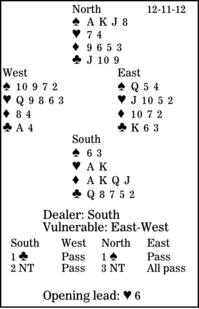Bridge column, December 11: Two chances are better than one

In today's deal, the necessity is winning nine tricks in three no-trump. How should South try to do that after West leads his fourth-highest heart and East puts up the 10?
In the old days, responder bid four-card suits up the line at the one-level. But nowadays, players often skip over diamonds to show a major. That is especially valid when the diamonds are weak and the major is strong.
South's rebid of two no-trump shows a balanced hand too strong for a one-no-trump opening and too weak for a two-no-trump opening -- usually 18 or 19 high-card points. It is in principle game-forcing, unless responder "miscounted" his points on the first round, bidding with fewer than the normally expected six points.
South starts with eight top tricks: two spades, two hearts and four diamonds. He does not have time to establish the clubs. The play would go heart, club, heart, club, run the hearts for down one.
Instead, declarer must try for a third spade trick. It looks normal to play low to dummy's jack, but that is not the best line. That requires West's having the queen (or the 10 and nine being doubleton or third). There is a second chance: that West has the 10 and nine of spades.
First, South should play a spade to dummy's eight. Here, it brings out the queen and the contract is home. But if East could win the trick more cheaply, South would finesse dummy's jack on the second round, having lost nothing when compared to a first-round finesse of the jack.
** ** **
COPYRIGHT: 2012, UNITED FEATURE SYNDICATE
DISTRIBUTED BY UNIVERSAL UCLICK FOR UFS

